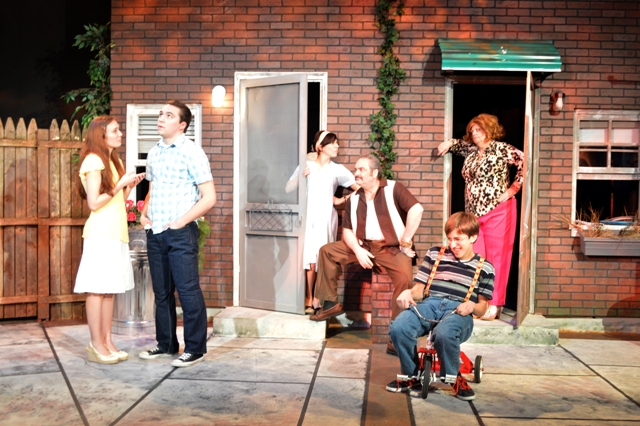The audience at the South Camden Theatre Company (SCTC) production of GEMINI was told they would enjoy an evening of comedic drama. SCTC gave them that and more with a script written by the theatrically beleaguered author, Albert Innaurato. GEMINI is Innaurato’s only commercial success as it ran for 1,819 performances on Broadway in 1977. Innaurato wrote more plays, few of which were critically praised and widely accepted by audiences, and he now keeps busy writing for newspapers and magazines about music and opera. In general the Innaurato “style” is ethnic and bombastic. The audiences on opening night enjoyed the methods that SCTC found to take GEMINI away from the cartoonish productions of the 1970s and make it a more realistic and genuine presentation.
SCTC directors, Ray Croce and Brad Reiter, found the “meat” inside this otherwise fluffy piece of ethnic comedy. The “meat” came in the form of the homosexual theme that permeates GEMINI. Croce and Reiter allow the characters to show the angst of the times dealing with a largely unspoken societal issue, but a solid resolution with a depth of feeling is not to be found. This is due to Innaurato, however, as the script does not provide an ending that generates for the audience any relief or acceptance. Croce and Reiter find the ethnic eccentricities in the script and use them to best advantage to showcase these South Philly characters as they make us laugh with their varying levels of dysfunction. However, one cannot find what isn’t there, and the ending provided is superficial and generally unsatisfying.
Enough about what is missing … let’s talk now about what there is in GEMINI. The characters are in-your-face, self-serving and confident of themselves in the way that dysfunctional people can be. They believe they are always right and everything happening around them is there for them to overcome as the heroes they have convinced themselves they are. These attitudes lead to hearty amusement at people we can identify with at some level. Maybe we have known Italians or Jews who have these quirks but not quite to the levels presented by this cast.
Croce and Reiter bring out the laughs in the situations and use the stage space (deftly and cleverly designed and executed by Robert Bingaman) well. Stained awnings, climbing ivy and the general grunge established time and place effectively. The curtains masking the house entrances did not always allow the quick exits required by some of the action. It was distracting but not overly harmful. Sometimes it appeared crowded on-stage but then again what backyard in South Philly isn’t crowded? The SCTC audience raking and some blocking did cause visibility problems when action moved from standing to sitting or lying on the floor. The rest of the production team supports this production very well. Stylish and in some cases right-on period costumes (Nicole DeRosa Lukaitis) succeed as well as myriad lighting patterns for both inside and outside the houses (Andrew Cowles and Joe Scotese).
Croce and Reiter worked wonders with the cast. The adults: Fran (Ray Croce), Bunny (Dawn Varava) and Lucille (Nicole DeRosa Lukaitis) brought their idiosyncrasies to the stage with style. They were comfortable with their characters, and everything they did was believable and even charming. While the laughter was primarily generated by the antics and verbosity of Varava’s Bunny, the complex relationship between Croce and Lukaitis was developed well. The business of Lucille’s not being hungry and yet eating from everyone else’s plates was very funny and done to theatrical perfection. The kids: Francis (Anthony Scanish), Joshua (Randy Hastings) and Judith (Allison Kessler) were slightly less successful. Each character was well defined, but their interactions were sometimes strained; and when a character emulsion was needed to make a point, the audience received discrete performances. Yet these actors were dealing with a difficult script and a time with which they were not familiar, and what appeared on stage was consistent and reasonable. It just didn’t reach the heights achieved by the adults. Hershel (Eli Russel) receives special kudos as his work (obviously in conjunction with Croce and Reiter) as an autistic teen enamored with all things “train” was well played and executed. Oftentimes playing a mentally impaired character can be off-putting to the audience, but Russel does a splendid job in keeping Hershel both charming and irritating in a little brother kind of way.
GEMINI being done in the 1970s was a play out of its time. The societal issues of homosexuality play better now. Innaurato needed to make this dark side of his play more obvious to give productions done now more to work with; but SCTC does a more than competent job in showcasing what Innaurato is known for and bringing into the light the issue he wanted to expose. Go for the laughs; stay for the angst; remember it.
GEMINI
Written by Albert Innaurato
Directed by Ray Croce and Brad Reiter
February 28 – March 16, 2014
South Camden Theatre Company at
The Waterfront South Theatre
400 Jasper Street
Camden, NJ 08104
Phone: 856-409-0365
www.southcamdentheatre.org


